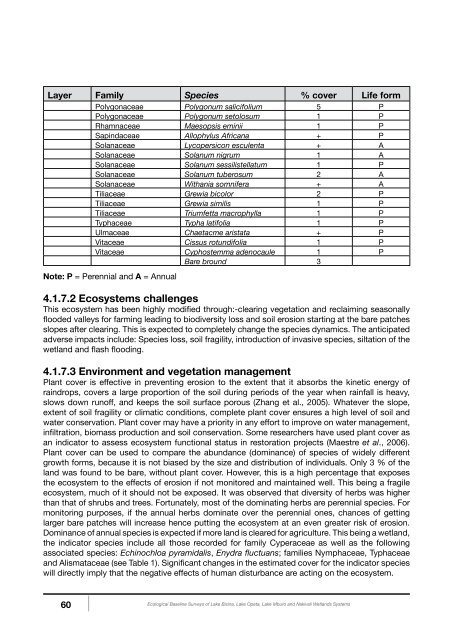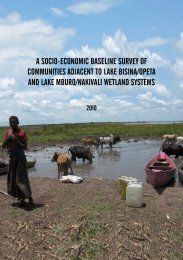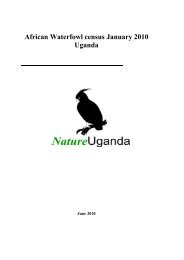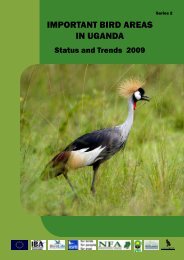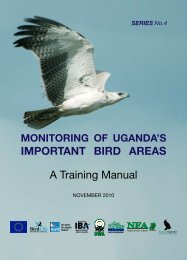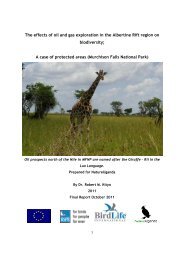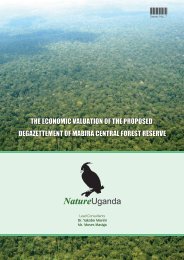A Ecological Baseline Surveys Of: - Lake Bisina - Nature Uganda
A Ecological Baseline Surveys Of: - Lake Bisina - Nature Uganda
A Ecological Baseline Surveys Of: - Lake Bisina - Nature Uganda
Create successful ePaper yourself
Turn your PDF publications into a flip-book with our unique Google optimized e-Paper software.
Layer Family Species % cover Life form<br />
Polygonaceae Polygonum salicifolium 5 P<br />
Polygonaceae Polygonum setolosum 1 P<br />
Rhamnaceae Maesopsis eminii 1 P<br />
Sapindaceae Allophylus Africana + P<br />
Solanaceae Lycopersicon esculenta + A<br />
Solanaceae Solanum nigrum 1 A<br />
Solanaceae Solanum sessilistellatum 1 P<br />
Solanaceae Solanum tuberosum 2 A<br />
Solanaceae Withania somnifera + A<br />
Tiliaceae Grewia bicolor 2 P<br />
Tiliaceae Grewia similis 1 P<br />
Tiliaceae Triumfetta macrophylla 1 P<br />
Typhaceae Typha latifolia 1 P<br />
Ulmaceae Chaetacme aristata + P<br />
Vitaceae Cissus rotundifolia 1 P<br />
Vitaceae Cyphostemma adenocaule 1 P<br />
Bare bround 3<br />
Note: P = Perennial and A = Annual<br />
4.1.7.2 Ecosystems challenges<br />
This ecosystem has been highly modified through:-clearing vegetation and reclaiming seasonally<br />
flooded valleys for farming leading to biodiversity loss and soil erosion starting at the bare patches<br />
slopes after clearing. This is expected to completely change the species dynamics. The anticipated<br />
adverse impacts include: Species loss, soil fragility, introduction of invasive species, siltation of the<br />
wetland and flash flooding.<br />
4.1.7.3 Environment and vegetation management<br />
Plant cover is effective in preventing erosion to the extent that it absorbs the kinetic energy of<br />
raindrops, covers a large proportion of the soil during periods of the year when rainfall is heavy,<br />
slows down runoff, and keeps the soil surface porous (Zhang et al., 2005). Whatever the slope,<br />
extent of soil fragility or climatic conditions, complete plant cover ensures a high level of soil and<br />
water conservation. Plant cover may have a priority in any effort to improve on water management,<br />
infiltration, biomass production and soil conservation. Some researchers have used plant cover as<br />
an indicator to assess ecosystem functional status in restoration projects (Maestre et al., 2006).<br />
Plant cover can be used to compare the abundance (dominance) of species of widely different<br />
growth forms, because it is not biased by the size and distribution of individuals. Only 3 % of the<br />
land was found to be bare, without plant cover. However, this is a high percentage that exposes<br />
the ecosystem to the effects of erosion if not monitored and maintained well. This being a fragile<br />
ecosystem, much of it should not be exposed. It was observed that diversity of herbs was higher<br />
than that of shrubs and trees. Fortunately, most of the dominating herbs are perennial species. For<br />
monitoring purposes, if the annual herbs dominate over the perennial ones, chances of getting<br />
larger bare patches will increase hence putting the ecosystem at an even greater risk of erosion.<br />
Dominance of annual species is expected if more land is cleared for agriculture. This being a wetland,<br />
the indicator species include all those recorded for family Cyperaceae as well as the following<br />
associated species: Echinochloa pyramidalis, Enydra fluctuans; families Nymphaceae, Typhaceae<br />
and Alismataceae (see Table 1). Significant changes in the estimated cover for the indicator species<br />
will directly imply that the negative effects of human disturbance are acting on the ecosystem.<br />
60<br />
<strong>Ecological</strong> <strong>Baseline</strong> <strong>Surveys</strong> of <strong>Lake</strong> <strong>Bisina</strong>, <strong>Lake</strong> Opeta, <strong>Lake</strong> Mburo and Nakivali Wetlands Systems


